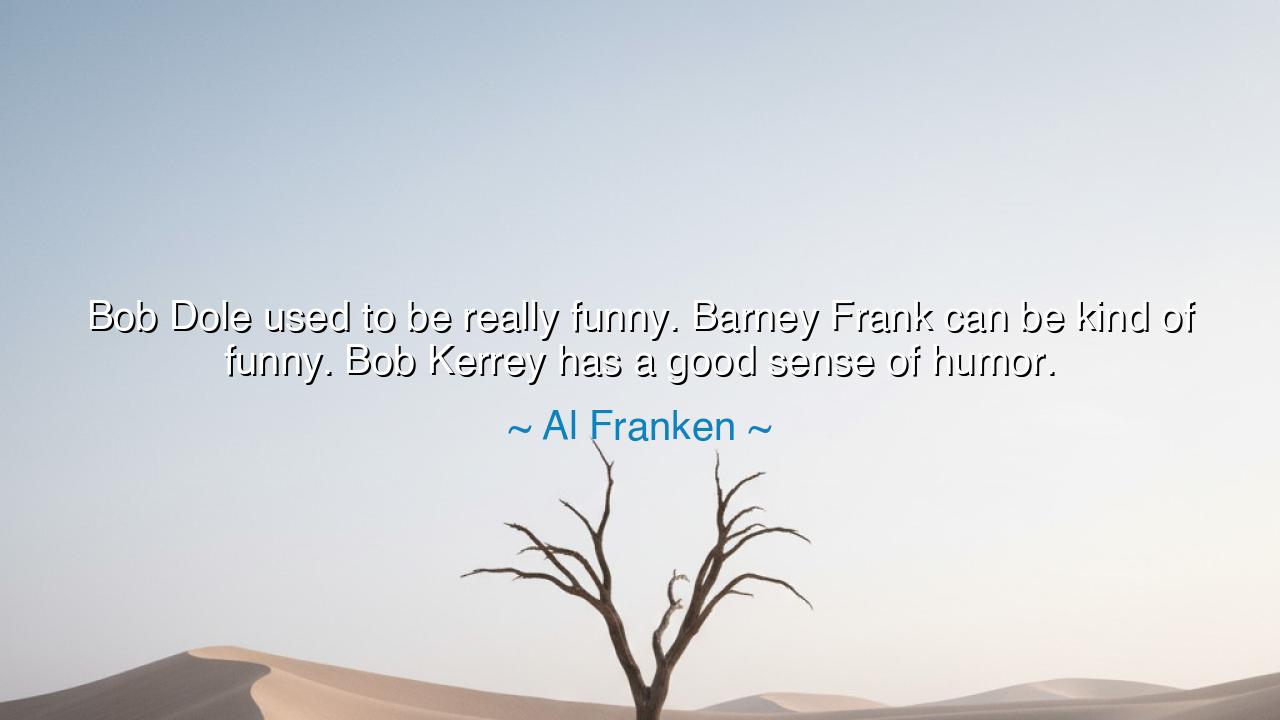
Bob Dole used to be really funny. Barney Frank can be kind of
Bob Dole used to be really funny. Barney Frank can be kind of funny. Bob Kerrey has a good sense of humor.






The words of Al Franken, though spoken with the lightness of comedy, hold within them the wisdom of one who has seen both the stage and the senate: “Bob Dole used to be really funny. Barney Frank can be kind of funny. Bob Kerrey has a good sense of humor.” At first glance, it seems but a passing remark, a simple reflection on a few political figures. Yet beneath its surface lies a profound commentary on the nature of humor, humanity, and leadership — on how laughter, when sincere, becomes a sign of character and grace even amidst the gravest halls of power.
To speak of humor among leaders is to speak of balance between the solemn and the human. In the world of politics — a world often cold with calculation, armored with rhetoric — laughter is a rare and sacred act. It pierces the veil of pretension and reveals the person beneath the position. Al Franken, himself a man who bridged the worlds of satire and statesmanship, recognizes that those who can laugh — especially at themselves — possess a strength that cannot be feigned. A sense of humor in power is not mere charm; it is evidence of humility. It is the reminder that even kings and senators are subject to the same absurdities as the rest of us.
Bob Dole, the seasoned war hero and senator, was known for a wit as dry as the plains of Kansas from which he hailed. His humor was never cruel, but often edged with self-awareness. After losing the presidency, he joked, “I slept like a baby — I woke up every two hours crying.” In that jest lay both dignity and vulnerability — the laughter of a man who could bear defeat without bitterness. This is the essence of real humor: the courage to find light even in loss. Such humor, the ancients would say, is not the laughter of mockery, but of wisdom — the laughter that springs from seeing life as it truly is, flawed and fleeting, yet still beautiful.
Then there was Barney Frank, whose quick tongue and sharp mind made him both feared and beloved in debate. His humor was not gentle, but fierce — the kind of wit that cuts through pretense like a sword through silk. Yet even in his sarcasm, there was truth. In his laughter, he held a mirror to hypocrisy, forcing those around him to confront their own contradictions. The ancients would have recognized him in the spirit of Diogenes, the philosopher who lived in a barrel and mocked the powerful to reveal their folly. In such humor, we find a moral purpose: laughter as revelation, laughter as justice.
Bob Kerrey, meanwhile, carried a different kind of humor — softer, reflective, tinged with the awareness of mortality. A war hero who bore the scars of battle, Kerrey’s wit was never boastful but contemplative, born of experience and loss. His sense of humor spoke not from the desire to entertain, but from the wisdom that life must be taken seriously only up to a point. He embodied what the ancients called eutrapelia — the virtue of well-timed laughter, the grace of knowing when to smile at the tragic absurdity of existence. Through such balance, humor becomes a form of courage, a way to remain human amid duty and pain.
The origin of Franken’s observation lies not only in his admiration for these men, but in his understanding that humor is the mark of a soul still awake. In politics, as in life, many lose this spark — becoming cynical, jaded, hardened by ambition. To “be funny” is not merely to tell jokes, but to see truth clearly enough to smile at it. When Franken says that Dole used to be funny, there is sadness in his tone — the acknowledgment that laughter, too, can fade when the heart grows weary or pride takes root. Humor, like wisdom, must be tended; it must remain grounded in humility and compassion, lest it turn to cruelty or vanish altogether.
The lesson, then, is both simple and eternal: keep your sense of humor, for it is the guardian of your humanity. Whether in the palace or the marketplace, the office or the home, never let the world’s gravity steal your laughter. Seek the strength to laugh at your own failures, and the grace to laugh with others, not at them. Remember that the greatest leaders — from Lincoln to Churchill — were not remembered for power alone, but for their wit, their ability to find light in darkness. A good laugh is not a retreat from truth, but an embrace of it; it reminds us that even in imperfection, there is dignity and hope.
And so, dear listener, take the wisdom of Al Franken’s words to heart. Be as Bob Dole, humble in defeat; as Barney Frank, bold in truth; as Bob Kerrey, wise in gentleness. Let your humor be a bridge, not a blade — a spark of warmth in cold times. For laughter is the music of the soul unbroken, the whisper of eternity reminding us that though life is brief and fraught with folly, it is still worth smiling through.






AAdministratorAdministrator
Welcome, honored guests. Please leave a comment, we will respond soon